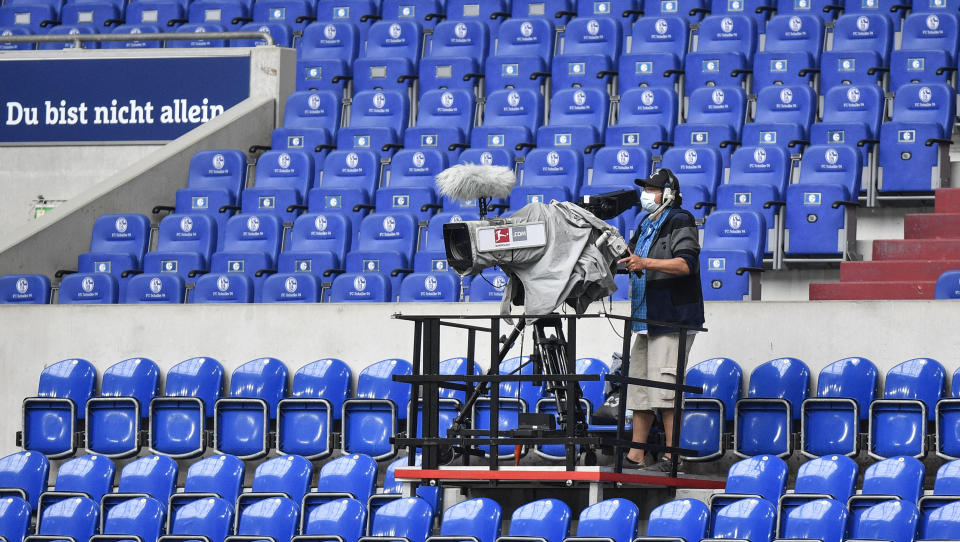Why are games without fans so jarring to watch on TV?
Slowly, sports are coming back. Wrestling returned first. Then Korean baseball, UFC, NASCAR and German soccer. A handful of other European soccer leagues are plotting their imminent comebacks. And every major American sports league is working out an elaborate plan to return to action, somehow some way.
But without any fans in the stands, the sports that have already returned seem a little off. Too quiet. Too placid. The action looks right, if a little rusty, but it doesn’t sound and feel quite right. It turns out that even on TV, the presence of fans in the stadium is an essential part of the viewing experience.
That’s what contributes to the sense that when sports do return, they’re not quite back to being what they were before. That’s why it’s so jarring when the only sound is of the play itself, echoing around tens of thousands of empty seats.
Glenn Cummins is a professor at Texas Tech who has studied the effect of crowd noise on sports viewing extensively. He argues that when we watch sports on TV, we take our social cues from the fans in the stadium. The level of crowd noise tells us when to pay attention, because many fans have a second or even third screen they’re engaging with while watching games.
“Social aspects are obviously such a crucial part of the sports viewing experience, and that’s if you’re watching at the stadium or in the arena, or whether you’re watching at home,” Cummins says. “It’s an inherently social activity that you watch with others.
“Such a big part of the broadcast is trying to capture some of that in-person, in-stadium experience. When all of a sudden that component is absent from the broadcast, it is striking. It’s something that, until it’s absent, we give so little thought to. It’s a very eerie experience.”

The effect of empty stadiums will be more pronounced in some sports than others. In the NBA, fans are right on top of the court and are ever-present in the TV broadcast. Hockey fans are squarely in the frame whenever there’s action around the boards. In the WWE, the fans are very much part of the narrative. In soccer, the momentum is reflected by the fan noise. In football, however, the absence might be less noticeable, since the TV angles are tighter and the field surrounded by players and coaches, with fans much further away.
FOX nevertheless plans on overlaying artificial crowd noise and digital fans — whereas the Bundesliga used cardboard cutouts of fans and one Korean soccer team might have used sex dolls — on its NFL broadcasts in the fall, should the season start on time.
Cummins figures a lot of at-home fans might not even notice the fake crowd noise if they don’t know about it, since the technology is very sophisticated. The challenge there will be getting that noise to swell and recede according to the cadence of the game in real time.
But the role of fan noise is nevertheless crucial. In one of his studies, Cummins took a college soccer radio broadcast and edited it to enhance crowd noise. People listening to the manipulated broadcast reported feeling more excited by the action than those listening to the original, unedited audio. A second study of an Olympic soccer TV broadcast confirmed that the role of sound significantly impacts the viewing excitement even when there are images to watch as well.
Lauren Smith, a sports media professor at Indiana University, predicts that most fans will quickly adjust to the altered TV product.
“In this first instance, it’s jarring,” she says, “because it’s such a huge part of sports that’s gone. But probably after a couple of weeks, we won’t notice it so much. It’s shocking at first, but it fades and becomes the new normal.”
In fact, there may be upsides. When the sounds of the coaching and the talking and the noises of the sport itself are no longer drowned out by the fans, it might feel more intimate, like you’ve been allowed into a closed-door scrimmage. However, not every fan consumes sports for the same reason, and that’s why some might lose interest when sports feels like less of a public event.
“Fans aren’t a monolith, they’re wide-ranging in why they watch sports,” Smith says. “For some fans, it’s not going to matter. For other fans that are more into the social scene, not necessarily the sport, [it will].”
So until stadiums can be packed again, if that ever happens, it will continue to feel like something’s missing, even if not everybody is equally bothered by it.
Leander Schaerlaeckens is a Yahoo Sports soccer columnist and a sports communication lecturer at Marist College. Follow him on Twitter @LeanderAlphabet.
More from Yahoo Sports:



